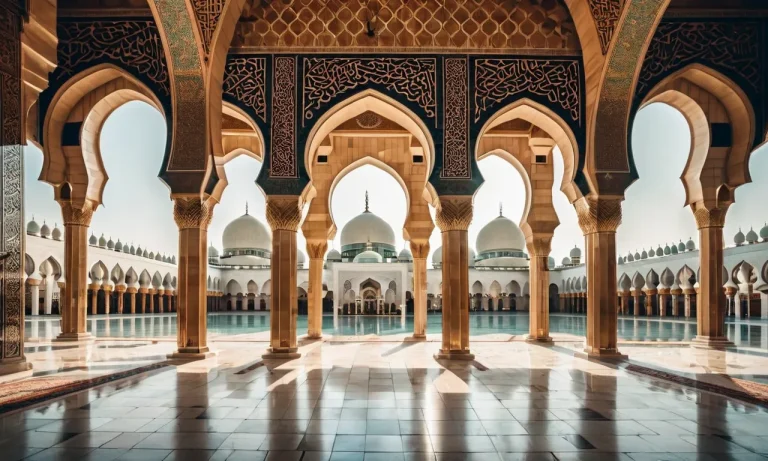Why Is It Called Babylon?
The name Babylon evokes images of the ancient Mesopotamian city that was the capital of the Babylonian empire in what is now modern-day Iraq. If you’re wondering why the ancient city lent its name to many modern places and concepts, read on to uncover the fascinating history behind the name Babylon.
If you’re short on time, here’s a quick answer: The name Babylon comes from the Akkadian ‘bāb-ilim’, meaning ‘Gate of God’. It was the capital of the ancient Babylonian empire and known for its grandeur and wealth, which led to the name becoming synonymous with excess and vice over time.
The Origins of the Name Babylon
Babylon, one of the most famous cities in ancient Mesopotamia, has a rich and fascinating history. The origins of the name Babylon can be traced back to the Akkadian language, which was spoken in Mesopotamia during the time of the city’s rise to prominence.
The Akkadian Name ‘Bāb-Ilim’
The Akkadians, who conquered the Sumerians and established their own empire in Mesopotamia around 2334 BCE, referred to the city as “Bāb-Ilim.” The term “Bāb” means “gate” in Akkadian, while “Ilim” is a reference to the god of wisdom, Enki.
This name can be interpreted as “the gate of the god Enki” or “the gate of the god of wisdom.” It is believed that this name was given to Babylon due to its status as a major center of learning and knowledge in ancient Mesopotamia.
Babylon as a Grand Capital City
As Babylon grew in power and influence, it became the capital city of the Babylonian Empire, ruled by famous kings such as Hammurabi and Nebuchadnezzar. The city’s strategic location along the Euphrates River made it a hub of trade, commerce, and cultural exchange.
Babylon was known for its impressive architectural and engineering feats, including the iconic Ishtar Gate and the Hanging Gardens, which were considered one of the Seven Wonders of the Ancient World. These grand structures contributed to the city’s reputation as a symbol of opulence and prosperity.
Furthermore, Babylon’s significance in religious and mythological beliefs further added to its fame. In the Bible, Babylon is mentioned in various contexts, including the story of the Tower of Babel and the Babylonian Captivity of the Israelites.
Today, the name Babylon continues to evoke a sense of mystery and wonder. The ancient city’s legacy lives on through its historical significance and cultural contributions to the world.
To learn more about the history of Babylon, you can visit https://www.britannica.com/place/Babylon-ancient-city-Mesopotamia-Asia.
Biblical and Historical Associations
When it comes to the name “Babylon,” there are several biblical and historical associations that come to mind. These associations have helped shape the perception and significance of the name throughout history.
Babylon in the Old Testament
In the Old Testament of the Bible, Babylon is mentioned numerous times. It was a prominent city in ancient Mesopotamia and served as the capital of the Babylonian Empire. The city is often associated with power, wealth, and grandeur.
It was known for its impressive architecture, such as the famous Hanging Gardens of Babylon and the towering ziggurats.
Babylon is also mentioned in several biblical stories, including the well-known tale of the Tower of Babel. According to the biblical account, the people of Babylon attempted to build a tower that would reach the heavens.
However, God intervened and confused their languages, resulting in the dispersion of the people into different regions.
The Hanging Gardens of Babylon
One of the most fascinating aspects of Babylon is the Hanging Gardens. These gardens were said to be built by King Nebuchadnezzar II for his wife, who missed the lush greenery of her homeland. The gardens were considered one of the Seven Wonders of the Ancient World and were renowned for their beauty and ingenuity.
Although there is no concrete evidence of the gardens’ existence, they are mentioned in various ancient texts, including the writings of the Greek historian Herodotus. The gardens were said to have been built on terraces, with plants and trees growing on each level, creating a stunning sight.
The Tower of Babel
The story of the Tower of Babel is an iconic biblical tale associated with Babylon. It speaks to the ambition of humanity and the consequences of overreaching. The tower was seen as a symbol of pride and arrogance, and its construction was seen as an act of defiance against God.
This story has been interpreted in various ways throughout history, but it continues to be a powerful reminder of the importance of humility and respect for a higher power.
Babylon as a Symbol
Babylon, the ancient city located in modern-day Iraq, has become a symbol of various concepts throughout history. The name itself carries a certain mystique and intrigue, prompting many to wonder why it is called Babylon.
This article aims to shed light on the symbolic meanings associated with the name.
Excess and Vice
One of the reasons why Babylon is often associated with excess and vice is due to its historical reputation as a city of indulgence. In ancient times, Babylon was known for its opulence, grandeur, and lavish lifestyles of its ruling elite.
The Hanging Gardens of Babylon, one of the Seven Wonders of the Ancient World, is a testament to the city’s extravagance. This association with excess and vice has been carried through the ages, leading to the name Babylon being used metaphorically to describe a place of decadence and immorality.
The comparison of a location to Babylon can be seen in literature and popular culture. For example, F. Scott Fitzgerald’s novel “The Great Gatsby” depicts the fictional city of West Egg as a modern-day Babylon, symbolizing the excessive materialism and moral decay of the Roaring Twenties.
Similarly, in the book of Revelation in the Bible, Babylon is portrayed as a symbol of immorality and corruption.
Confusion and Chaos
Another symbolic interpretation of Babylon is that of confusion and chaos. The name Babylon is derived from the Akkadian word “Bab-ilu,” which means “gate of the gods.” This reference to gates has led to the association of Babylon with the idea of a gateway between different realms or dimensions.
Throughout history, Babylon has been seen as a place of cultural and linguistic diversity. The city was home to a wide range of ethnicities and languages, leading to a mix of traditions and customs. This multicultural aspect of Babylon has contributed to the perception of the city as a symbol of confusion and chaos.
In modern usage, the term “Babylon” is sometimes used to describe a state of confusion or disorder. It can be used to refer to a situation where there is a lack of understanding or clear communication.
For example, someone might say, “It feels like Babylon in here” when referring to a chaotic and disorganized environment.
Modern References to Babylon
Throughout history, the ancient city of Babylon has left a lasting impact on various aspects of human culture. From religion and spirituality to politics and activism, as well as art and media, Babylon continues to be referenced in modern times.
Let’s explore some of these references and their significance.
In Religion and Spirituality
Babylon holds great significance in various religious and spiritual traditions. In the Bible, Babylon is mentioned numerous times, most notably in the Book of Daniel. The city represents a symbol of power, corruption, and the downfall of empires.
It serves as a cautionary tale against hubris and the consequences of straying from righteousness.
In Islam, Babylon is mentioned in the Quran as a city of great significance. It is associated with the story of the Tower of Babel, where people attempted to build a tower to reach the heavens but were punished by God for their arrogance.
Furthermore, Babylon has been referenced in other religious and spiritual contexts, symbolizing concepts such as sin, temptation, and spiritual decay. Its mention in these texts serves as a reminder of the consequences of moral corruption.
In Politics and Activism
The name Babylon has also been invoked in political and activist movements. The term “Babylon” is sometimes used as a metaphor for an oppressive or corrupt system that needs to be dismantled. It represents the idea of resistance against authority and the fight for liberation.
For example, during the civil rights movement in the United States, activists used the term “Babylon” to refer to the oppressive systems of racism and discrimination that they were fighting against. It became a rallying cry for equality and justice.
Similarly, in contemporary protest movements around the world, the term “Babylon” is often used to criticize oppressive governments or institutions that prioritize profit over people. It serves as a symbol of resistance and the desire for a more just and equitable society.
In Art and Media
Babylon’s rich history and symbolism have also inspired countless artists and filmmakers. Its iconic imagery and stories have been depicted in various forms of art, literature, and film.
From paintings and sculptures to music and literature, Babylon has been a subject of fascination and interpretation for artists throughout the centuries. It has been portrayed as a magnificent city of grandeur and opulence, as well as a symbol of decadence and moral decay.
In popular culture, Babylon continues to be referenced in movies, television shows, and music. It often represents a place of excess, temptation, or a metaphor for a society on the brink of collapse.
Conclusion
So why do we still reference the ancient city of Babylon today? As we’ve seen, the name carries deeply rooted historical and biblical associations with grandeur, excess, confusion and chaos. Over time, Babylon became a symbolic shorthand referencing these concepts in religion, politics and culture.
So next time you hear references to Babylon, consider the long history and evolution behind this evocative name.








